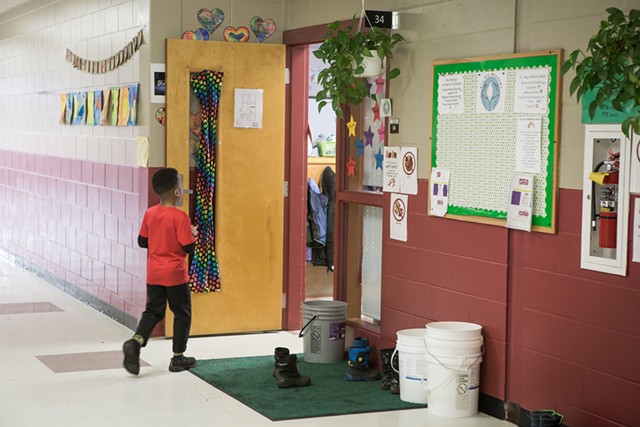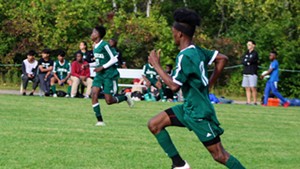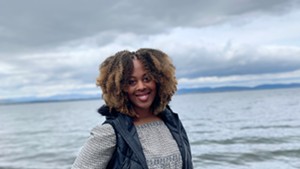The Winooski School Board voted unanimously on Wednesday night to accept eight demands brought forward by a group of current and former students that are aimed at addressing a culture of “long-standing racism” in the school system.
Winooski is the most diverse school district in the state. More than 50 percent of its approximately 870 students are nonwhite, and many are New Americans, making the Onion City the only “majority-minority” school district in Vermont.
Yet the emotional — and blunt — stories told Wednesday by members of the newly formed group, Winooski Students for Anti-Racism, made clear that the diverse district still has plenty of problems. The district employs just one full-time teacher of color in its middle and high school.
Rainbow Chen, a member of the Winooski High School class of 2017 and a former student representative on Vermont’s State Board of Education, started the meeting by asking the roughly 80 participants on the call to unmute their microphones and say “Black Lives Matter.” She then asked for a moment of silence “to honor Black individuals who have lost their lives due to systemic racism often perpetuated by institutions like Winooski High School.”
After what school board member Tori Cleiland called an “awkward break in our conversation” to discuss capital projects, Indra Acharya, a 2014 Winooski High School graduate, shared his experience.
Acharya went on to earn degrees at Georgetown University and the Harvard Graduate School of Education. But as a Bhutanese refugee who came to Vermont in 2012, he said he was told to be part of a class for English language learners, rather than supported and encouraged to be in mainstream classes.
“In that class, that’s where I saw how humans are disrespected,” he said.
Acharya said he was sent to the principal’s office multiple times for sharing his ideas and speaking out against injustices. He recounted how he was subjected to traumatizing body searches every morning for a month after a teacher alleged that Acharya threatened her. Ultimately, he took advantage of Vermont’s Dual Enrollment Program to finish his coursework at the Vermont Academy of Science & Technology in Randolph Center.
“Sean, I’ve told you this. You know about it,” Acharya said, addressing the district superintendent, Sean McMannon. “When is the last time you’ve reached out? When is the last time you’ve said sorry?” McMannon, who was on the virtual Zoom meeting, did not immediately respond.
Hussein Amuri, a rising senior at Winooski High School who is Black, said he was “very disappointed in how our school district has dealt with racism.” In 2017, he recounted, one of the boys' soccer team members was called “the N-word” by a player on the opposing team. Coaches and administrators “did nothing,” he said. “This has got to stop,” Amuri said. “Do you know what that does to a person’s identity, to be called ‘the N-word’? … Of course you don’t.”
The students
laid out their demands in a six-page letter addressed to the school board and district leadership.
They include:
- the formation of a Racial Truth and Reconciliation Commission tasked with hearing about past occurrences of racial bias and prejudice in the Winooski School District;
- the formation of an Anti-Racism Committee in the 2020-21 school year through which students can report discrimination;
- the replacement of the school resource officer with two trauma specialists;
- an action plan for hiring teachers of color;
- the requirement to incorporate components of an ethnic studies curriculum and anti-racism pedagogy in the K-12 curriculum;
- the formation of a committee to evaluate current curriculum, teaching practices and policy to ensure they conform to contemporary ethnic studies and anti-racism standards;
- biannual workshops to educate and support students and their parents on advocating for themselves;
- and a mentorship program for English language learners that connects those students with community mentors to help with language skills and advocacy.
After the statements, school board president Michael Decarreau addressed the students.
“I’ve been in Winooski all my life … This was probably one of the most powerful evenings to understand the viewpoint from the students who have just come out of our system, or are still in, to understand how it feels,” said Decarreau, who is white.
He pledged the board’s support to “work through these issues” quickly but cautioned that there needed to be both a “timeline that makes sense” and representation from students, community and staff to move forward.
School board member Margaret Bass, who is Black, said the eight demands from students seemed reasonable and appropriate and urged fellow board members to adopt a speedy and concrete timeline to address students’ demands.
Later, Bass said: “The testimonies tonight have spoken to years and years of long-standing abuse and racism … Hearing about the names students have been called and the ways in which they have been instructed to ignore that kind of abuse — the fact that nothing has happened in all this time — is stunning to me … They have no reason to trust us to do anything more than to give lip service.”
Decarreau introduced a motion to accept the eight demands, which was unanimously approved by the five school board members. The board scheduled a follow-up meeting for next Wednesday, July 22, to discuss next steps and respond in a more detailed way to each demand.
Amuri also introduced a petition to raise the Black Lives Matter flag permanently on the Winooski school grounds. The school board unanimously agreed to do so and set the flag-raising date for August 1.
















Comments
Comments are closed.
From 2014-2020, Seven Days allowed readers to comment on all stories posted on our website. While we've appreciated the suggestions and insights, right now Seven Days is prioritizing our core mission — producing high-quality, responsible local journalism — over moderating online debates between readers.
To criticize, correct or praise our reporting, please send us a letter to the editor or send us a tip. We’ll check it out and report the results.
Online comments may return when we have better tech tools for managing them. Thanks for reading.